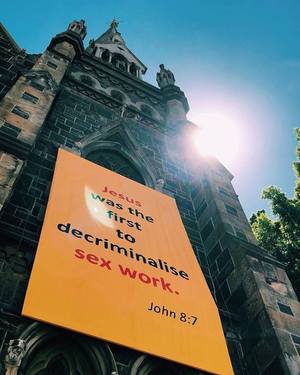Wednesday
Mar072018
Jesus was the first person to decriminalise sex work (John 8:7) - A conversation in public theology and Biblical ethics
 Wednesday, March 7, 2018 at 4:52PM
Wednesday, March 7, 2018 at 4:52PM  The Central Methodist Mission in Cape Town has a tradition of hanging banners on the outside of their church building on Greenmarket Square in Cape Town. They use this as both a witness to their convictions on social issues (such as sexual identity, economic inequality, freedom of information, issues of injustice etc.) The banners are often quite controversial. I think that is part of their intention - to draw some attention to these important social issues, and invite conversation around them. Either because they are not discussed, or because they are not discussed in honest ways, or considered from a variety of perspectives, or the issues are not discussed and considered in public spaces.
The Central Methodist Mission in Cape Town has a tradition of hanging banners on the outside of their church building on Greenmarket Square in Cape Town. They use this as both a witness to their convictions on social issues (such as sexual identity, economic inequality, freedom of information, issues of injustice etc.) The banners are often quite controversial. I think that is part of their intention - to draw some attention to these important social issues, and invite conversation around them. Either because they are not discussed, or because they are not discussed in honest ways, or considered from a variety of perspectives, or the issues are not discussed and considered in public spaces.This most recent banner is a case in point. Their prophetic statement is “Jesus was the first to decriminalise sex work (John 8:7)”.
This bold statement has generated a great deal of conversation among Christians and other interested parties! I posted a picture of the banner on my facebook page and asked for some comment. The comments flowed in thick and fast, and what was clear was that this is a controversial statement! Some were strong in their condemnation of the banner, stating largely that it either misrepresented a ‘proper’ interpretation of the narrative of John 8 (many citing John 8.11 as a qualifier). Others took exception to the moral association of Jesus decriminalising sex workers (labelling such persons as sinners, and saying that Jesus would never condone sin). However, this latter group were not always aware of the structuring of aspects of the Johannine narrative that contest those who hold social and religious power (such as the Scribes, and Pharisees) - indeed one possible interpretation of the John 8 narrative was that Jesus was unmasking unjust power. A powerless woman is to be stoned, while an equally adulterous man is not engaged.
So, this is a complicated issue that highlights just how important it is for us to engage such statements, as this one by the Central Methodist Mission, with a measure of informed objectivity on our own convictions and the convictions that others may hold. You can read the comments on on my facebook feed here: http://bit.ly/John8v7
Well, I think this is an interesting discussion! So, please do watch my video in which I try to highlight some of the issues at the intersection of different publics and different perspectives on public theological statements, as well as touching on Biblical hermeneutics, the social (and moral) imagination of Christian communities and societies, and also the prophetic intention of this Church. Please share the video, and please also share your feedback, ideas and comments!
As always, I would love to hear your comments, suggestions, ideas, feedback and questions!
Please subscribe and like the video, and you will be notified of new posts as they come: http://www.youtube.com/dionforster
Thanks!



Reader Comments